Insights from the UK 2024
FSC UK's 2024 survey revealed that when shopping for products made from wood or paper, more people recall the FSC label than any other certification label. And, amongst UK consumers, 79% said they recognise the FSC logo.
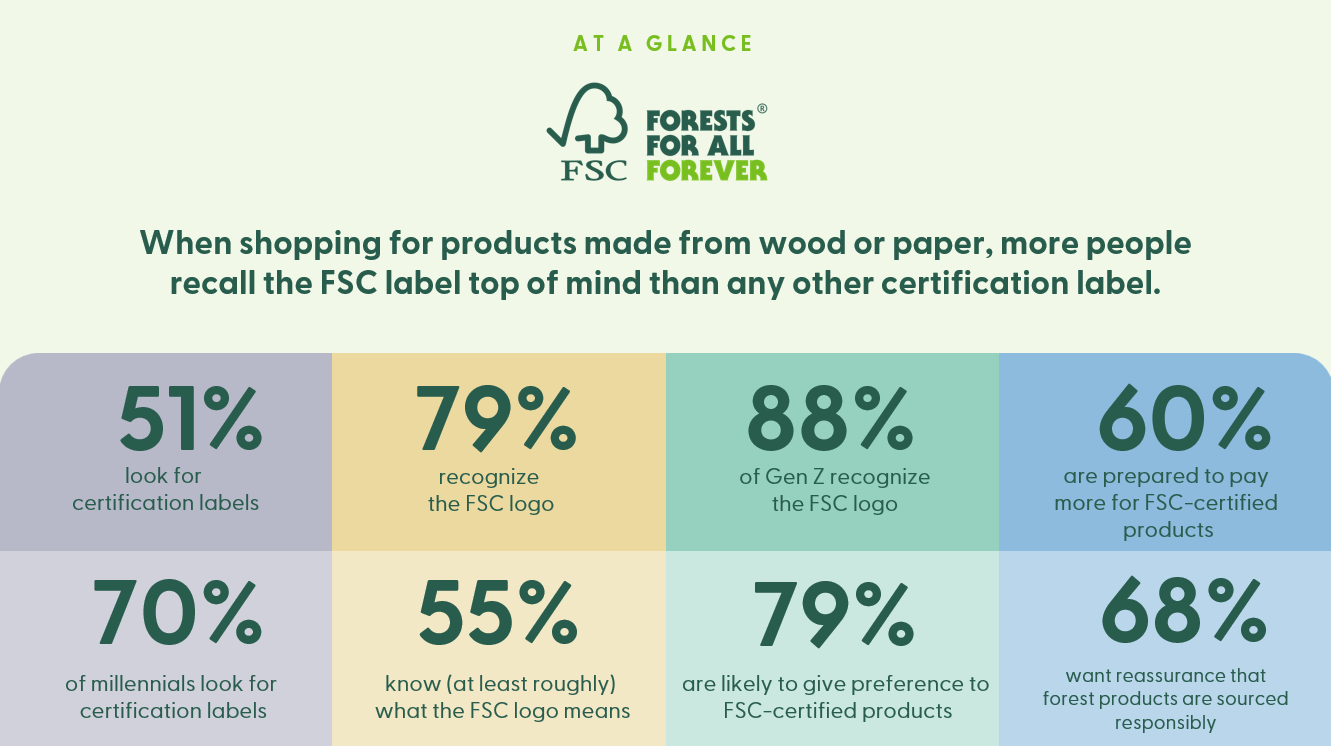
Shopping responsibly
More than half of those surveyed look for certification labels when shopping for forest-based products, and 90% of those recognise the FSC logo. Younger people are most likely to recognise and understand the FSC logo; Gen Z lead the way with 88% recognising the logo and 66% confident that they understand at least roughly what it means. Across the generations, 79% would give preference to FSC-certified products, with 60% prepared to pay more for them.
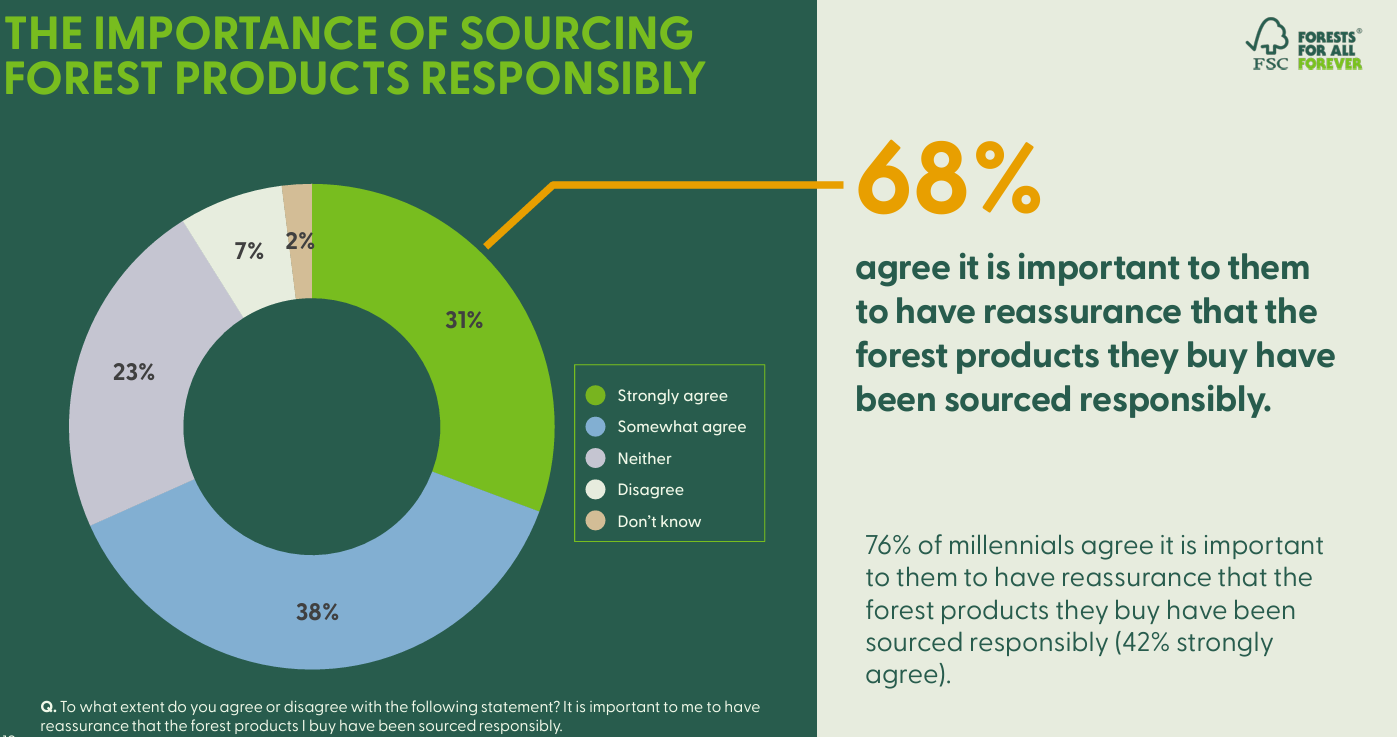
Brand Reputation
67% of UK consumers would have a more positive opinion of a brand or retailer if they saw the FSC label on their products. Generationally, this figure is highest amongst 25-34 years olds, with 80% positively influenced by the availability of FSC-certified products. With FSC chain of custody certificate and FSC promotional licence holders, citing improved brand image as one of, if not the top, benefit of their FSC association, brands and retailers seeking this and other benefits may consider not only introducing FSC certification in their procurement policies and requesting that their suppliers apply the FSC label to applicable products and packaging, but also considering FSC chain of custody or a promotional licence, as appropriate to the scope of their business.
FSC UK Consumer Survey 2024 conducted (21/03/2024 – 25/03/2024) in United Kingdom by Kantar via OnLineBus, a sample of 1,279 UK adults aged 16+ were interviewed
Insights from the UK 2023
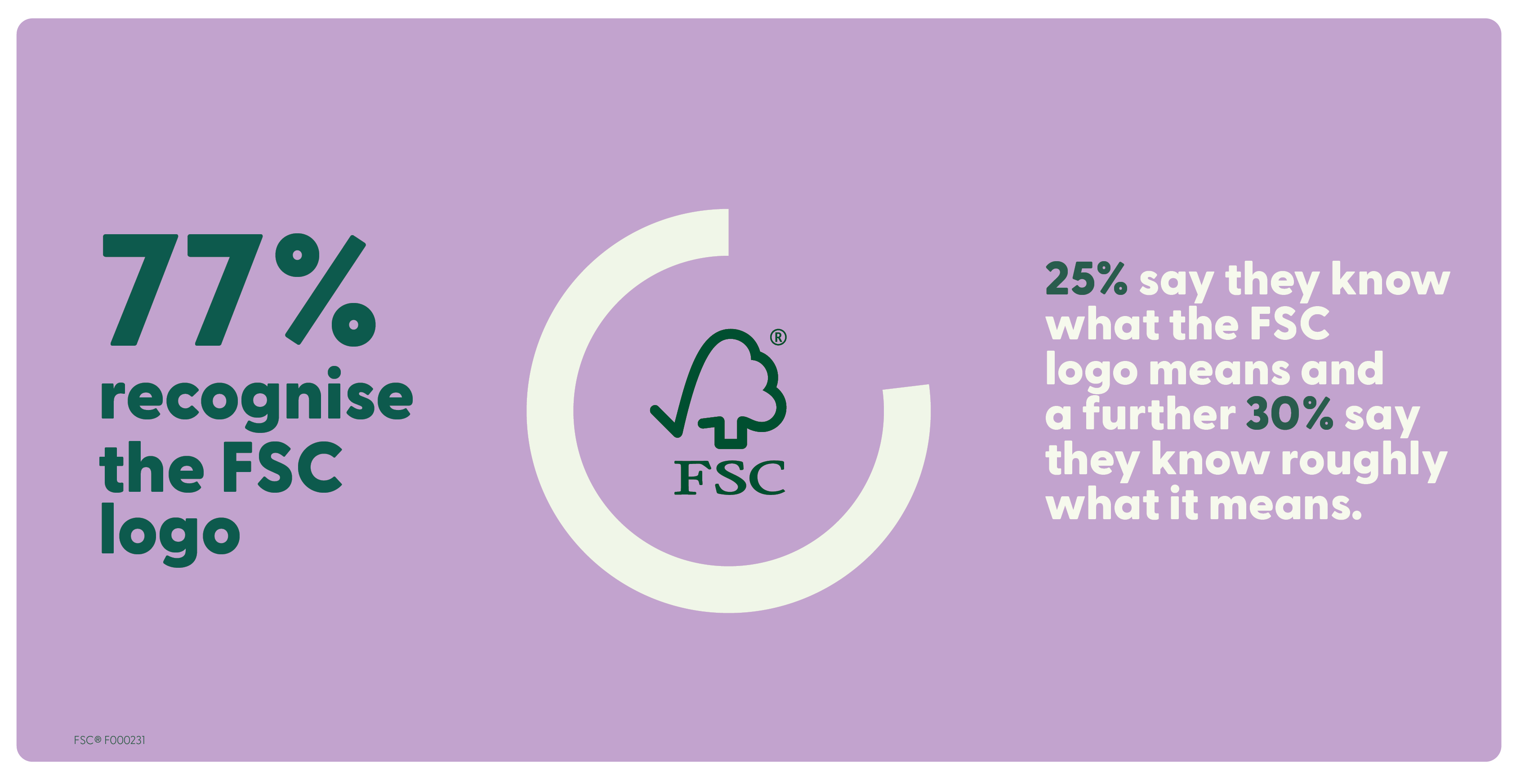
Our 2023 survey revealed that 77% of people in the UK recognise the FSC logo. 25% say they know what it means, and a further 30% say they know roughly what it means.
30% of those who recognise the logo recall buying an FSC-certified product within the past 3 months, 19% within the past month. 41% say they always or usually give preference to FSC-certified products.
Once the meaning of FSC was explained, 71% of all those surveyed, said they would be very or fairly likely to give preference to FSC-certified products in future. 85% of those who said they both recognised and understood the FSC logo, and 81% of those who recognise it and know roughly what it means, said they were likely to give preference to FSC-certified products.
However, only 38% of people claim to look for products that carry certification labels when they shop for forest-based products, suggesting that further promotion of certifications, beyond just labels such as FSC, may be beneficial to support consumers in meeting their ethical shopping preferences. 51% stated that they would be prepared to pay more for an FSC-certified product, with 28% prepared to pay up to 5% more and 10% prepared to pay up to 10% more.
Half of those surveyed were of the belief that all wood-based products available in the UK should be made from sustainable sources and a further quarter thought at least some should meet this standard. 60% thought that consumers have a responsibility to ensure that the products they buy, and the packaging they use, are responsibly sourced, but 71% held businesses responsible for the sustainability of their products and packaging.
This survey (21/03/2023 - 23/03/2023)was conducted in United Kingdom by Kantar via OnLineBus, a sample of 1279 UK adults aged 16+ were interviewed.
Insights from the UK - 2022
The results of the 2022 FSC UK Consumer Survey reveal public opinion on forests and climate change, FSC logo recognition, generational differences, and a degree of uncertainty around which kinds of products can come from trees.
Three quarters of people in the UK agreed that healthy forests are of crucial importance in the fight against climate change.
And ensuring that products from forests have been sourced responsibly was important to most, with 63% wanting reassurance about the forest products they buy. A study of 1,281 adults* found that 6 in 10 people in the UK assumed that some, or even all, of the wood-based products they buy are from sustainable sources.
Three quarters recognised that sourcing sustainable wood and paper is good for both forests and the planet in general, but most weren't sure how to tell if these products are sustainable.
There was also uncertainty when it comes to other forest-products, with 87% unaware that viscose and textiles, and 73% unaware that shoe soles (which can be made from natural rubber), can be sourced from trees. And yet, three quarters said that they think natural rubber and materials made from trees, such as viscose, should be responsibly sourced.
6 in 10 also reported becoming more conscious of the sustainability of both products and packaging. And 35% say they keep an eye out for certification labels when shopping for forest-based products.
76% of people in the UK recognised the FSC logo. Two thirds of respondents who had seen the logo were also confident they understand, at least roughly, what it means.
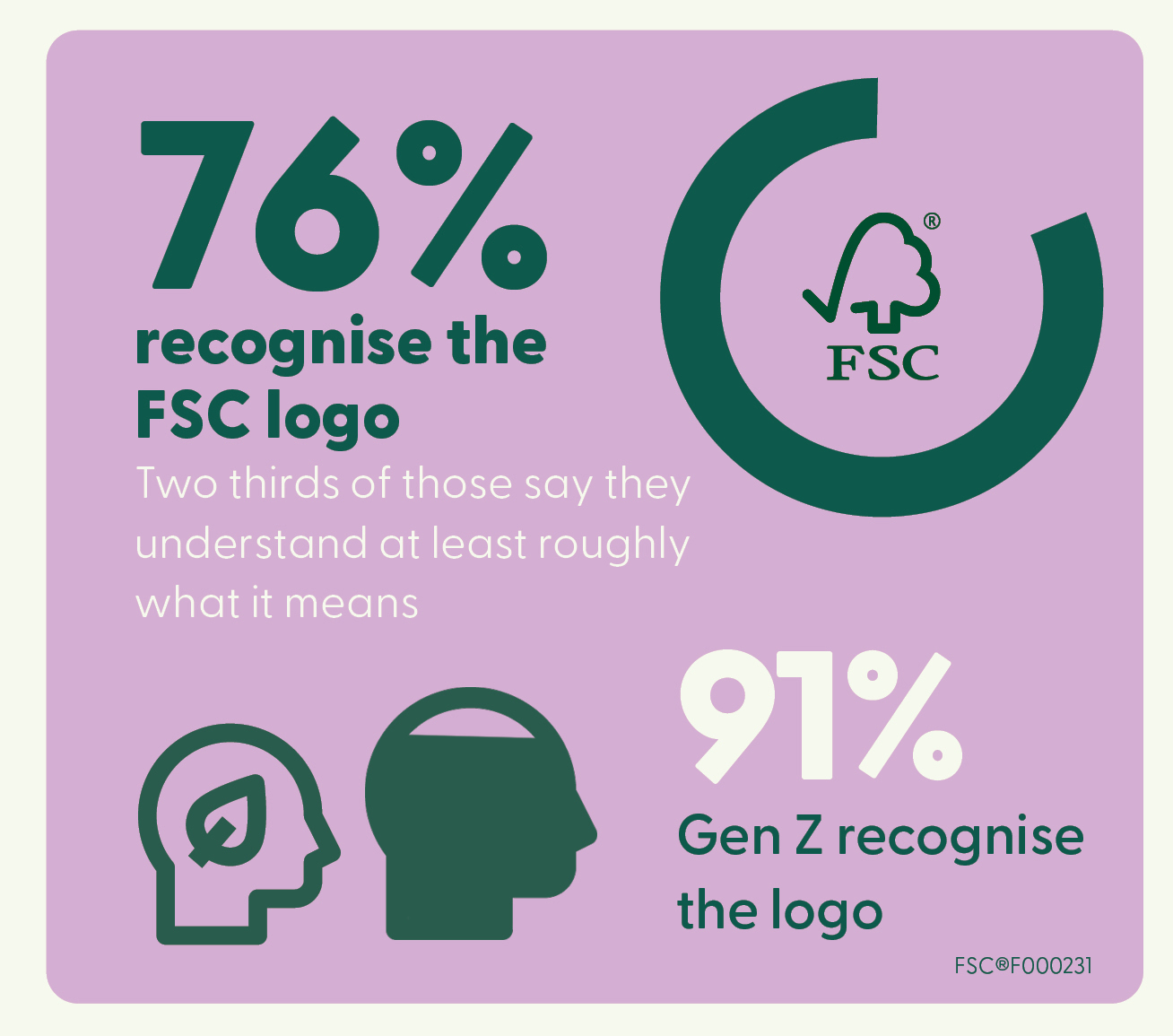
Once the meaning was explained, 7 in 10 people said they would prefer to buy a forest product bearing the FSC logo, as opposed to one without, only 1 in 10 stated that this was unlikely to positively influence their purchasing decision. Half of respondents even said they would be prepared to pay more for FSC-certified products and 65% said they would have a positive opinion of a brand or retailer if they saw the FSC label on their products.
Ecosystem Services
The survey also reveals findings on how shoppers might view brands and companies investing in ecosystem services (the benefits that we obtain from nature and natural processes).
63% of people in the UK said they would have a more positive opinion of a company if they knew they had invested in nature or climate-positive projects. The FSC Ecosystem Services Procedure builds on FSC forest management certification by allowing forest managers or owners to make specific, credible claims on how their management activities are contributing to maintaining and/or enhancing various ecosystem services in their forests.FSC verified ecosystem service claims help financial sponsors demonstrate their commitment to sustainability and to reducing deforestation and forest degradation.
Generations of consumers
The survey revealed some generational differences, with older people, including the at times maligned Baby Boomers, most concerned about whether forest-based products have been sourced sustainably, and most convinced of the importance of sourcing sustainable wood and paper.
But younger people tended to be more confident in identifying sustainably sourced forest products, with 3 in 10 millennials sure of how to tell.
Millennials were also most clued up about viscose, but still just 15% realise that it could be sourced from trees. Nearly half of those aged 25-34 keep an eye out for certification labels when shopping for forest-based products and 91% of Gen Z recognise the FSC logo.
* Survey conducted (24/03/2022 - 28/03/2022) in United Kingdom by Kantar via OnLineBus, a sample of 1281 UK adults aged 16+ were interviewed.
Insights from the UK - 2021
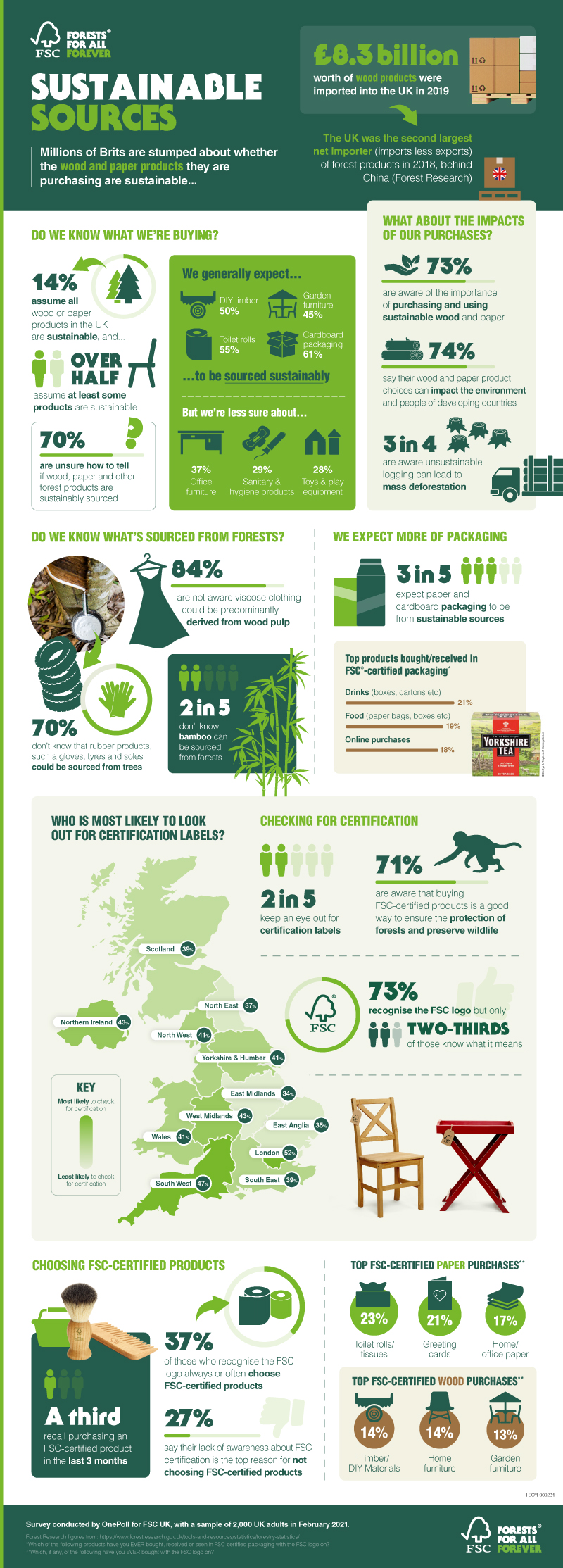
Our 2021 survey found that 73% of adults in the UK recognised the FSC logo, which had increased from 67% in 2020, and 55% in 2019. 37% of those who recognised the logo stated that they always or often choose FSC-certified products, and a third recall purchasing an FSC-certified product in the last 3 months.
Most consumers were aware of the potential impacts of their purchases, including impacts to the environment, people in developing countries, and the risk of mass deforestation.
But despite many expecting items such as DIY timber (50%), cardboard packaging (61%), toilet rolls (55%), and garden furniture (45%) to be sourced responsibly, 70% of surveyed consumers were unsure how to tell if this is true of the products they buy.
The top 3 products respondents stated they had bought or received in FSC-certified packaging were drinks (21%), food (19%), and online purchases (18%).
Lack of knowledge of what products come from forests could be standing in the way of informed purchasing decisions. 70% of consumers were unaware that rubber products such as gloves, tyres and shoe soles can be sourced from trees, and 84% were unaware that viscose clothing could be derived from wood pulp.
Looking for the FSC logo on products helps consumers to make sustainable shopping choices. FSC certification provides an assurance not just of legality but also of responsible management.
